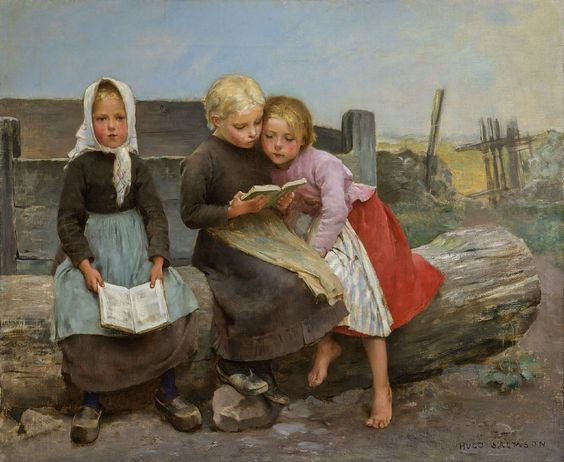Blast from the Past: So much has changed since this was first posted 12 years ago, so I decided to update this. Then, supporting children’s summer reading was a nice thing to do, but these days it is critically important given how much face-to-face schooling kids have missed. I’ve added a few ideas here and provided a lot of useful link that are all up to date. Send this along to your favorite parents, teachers, and librarians.
May 29, 2009 updated June 26, 2021
This is the time of the year when schools often try to reach out to parents to encourage their kids to continue to read over the summer. Not a bad idea--reading is a lot of fun and keeping in practice can mean a faster start to next school year. Here are some suggestions for parents that you might want to pass on (or to use with your own kids)....
Summertime and the readin' is easy, fish are jumpin' and the cotton is high....
Dear Parents:
Another school year has ended, but that shouldn’t mean that your kids can stop reading and writing. Research shows bad outcomes for kids who don’t read (their reading test scores decline). A summer away from school should not be a summer away from reading. Encourage your children (teens, too) to read over the summer. It’s one of the most loving things you can do for them!
Here are some suggestions that might help:
- Summer usually allows families to spend more time together. This can be a great opportunity to read with your kids. Children can learn a lot from being read to, and it is a lot of fun, too. Even if they can read by themselves, take turns reading to each other, and be sure to talk about what you are reading. Ask questions, answer questions, explore the ideas together, but read.
- As kids get older, help them find books, magazines, or newspaper articles that they would enjoy reading, and you read to them, too (trips to the library together are a great idea for finding such material). Or read the same book they are reading for class over the summer so you can discuss it. The point is to share the reading experience.
- Even if you are not reading the same books that they are, talk to your children about what they are reading. Ask them questions such as what happened in the story or what might happen next, who is their favorite character, or who is the villain. This builds summarization and recall skills, and your interest can help increase their interest.
- Create a summer reading nook or spot in your home. Make sure there is good light and comfortable seating and try to set aside one TV/video-game-free night per week for family reading. Reading night can be a special snack night, too. There is nothing better than reading with a big bowl of popcorn or cookies and milk.
- If your children’s school program provides materials for home activities, absolutely use them.
- If you are taking a trip this summer, send for brochures and maps and have your children read them aloud with you.
- Don’t ignore the value of graphic novels or a popular book series like the Twilight books. These are great ways to encourage adolescents to read more. If you are having trouble finding books that your kids want to read try these resources from the International Literacy Association:
- Whether you are reading to your children, or they are reading themselves, plan an outcome event or activity based on the reading. For instance, if the book has been made into a movie, watch the DVD together after reading the book. Book reading can lead to picnics, museum and zoo visits, ballgames, or even family vacations (we took our kids to Chincoteague Island and Hannibal, Missouri as a result of reading Misty of Chincoteague and The Adventures of Tom Sawyer with them).
- Write notes or letters to your children. What a great opportunity to remind them of experiences that they had when they were younger or to tell them about the lives of older people in the family, like their grandparents. Kids love getting letters and sometimes they’ll even write back. Other writing activities make sense, too.
https://www.startwithabook.org/summer-writing
- Don’t just focus on storybooks. Kids often prefer to read about fact rather than fiction, including books and articles about the environment, animals, current events, sports, and other factual topics. Talk to them about what they like and help them find reading materials that match those interests.
https://www.science-sparks.com/summer-science/
https://lemonlimeadventures.com/must-try-summer-science-activities-for-kids/
- Consider taking on a family cultural study… reading some books about or from a particular country and then supplementing this reading with examinations of relevant art, visits to museums, meals at ethnic restaurants (or cooking experiments at home, etc.
- Take on a genealogical study. Kids love finding out about their families and there is a lot of reading and writing involved in that kind thing (there is a link below on that).
https://www.genealogy.com/articles/research/67_taylor.html
These days most communities provide activities aimed at promoting reading. Check with your local library, park district, museums, zoos, churches, and the like. However, just in case those resources aren’t available or for some reason you can’t take advantage of them, there are many available through the Internet. You can find free books resources in the Resources section of my website and here are a slew of summer supports and activities.
https://www.scholastic.com/site/summer/home.html
https://kids.scholastic.com/kids/games/homebase/
https://www.nea.org/resource-library/get-serious-about-summer-reading
https://www.weareteachers.com/10-summer-reading-programs-for-kids/
https://www.ala.org/alsc/publications-resources/book-lists/2021-summer-reading-list
https://www.science-sparks.com/summer-science/
https://lemonlimeadventures.com/must-try-summer-science-activities-for-kids/







Comments
See what others have to say about this topic.